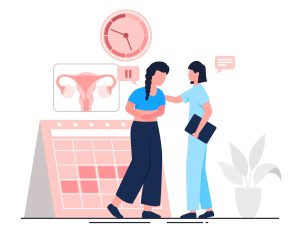Hormonal imbalances are one of the leading causes of fertility issues in both men and women. Hormones play a critical role in regulating reproductive functions, such as ovulation, sperm production, and menstruation. When hormone levels are out of balance, it can affect the body’s ability to conceive and maintain a healthy pregnancy. Understanding how hormonal imbalances impact fertility is key to identifying and addressing the root causes of infertility.
What are Hormonal Imbalances?

Hormonal imbalances occur when the body produces too much or too little of certain hormones, which are chemical messengers that regulate various processes in the body. In the context of fertility, hormones like estrogen, progesterone, testosterone, follicle-stimulating hormone (FSH), and luteinizing hormone (LH) are essential for proper reproductive function.
These hormones work together to control ovulation in women and sperm production in men. When these hormones are not at optimal levels, the reproductive system can become disrupted, leading to difficulty conceiving or carrying a pregnancy to term.
How Hormonal Imbalances Affect Female Fertility
Hormonal imbalances are a common cause of infertility in women. There are several specific conditions related to hormonal disruptions that directly affect a woman’s ability to conceive:
1. Polycystic Ovary Syndrome (PCOS)
PCOS is one of the most common causes of hormonal imbalance in women. It is characterized by the overproduction of androgens (male hormones) and often leads to irregular or absent menstrual cycles, which makes ovulation infrequent or unpredictable. As a result, women with PCOS may struggle to get pregnant because they do not ovulate regularly.
Other symptoms of PCOS include weight gain, acne, excessive hair growth, and difficulty maintaining a healthy weight. Fertility treatments for PCOS typically include medications that regulate ovulation or assistive reproductive technologies like IVF (in vitro fertilization).
2. Thyroid Disorders
The thyroid gland, located in the neck, produces hormones that regulate metabolism, energy levels, and overall body function. An overactive thyroid (hyperthyroidism) or an underactive thyroid (hypothyroidism) can disrupt ovulation and menstrual cycles, leading to fertility problems.
- Hyperthyroidism causes the body to produce too much thyroid hormone, speeding up metabolism and interfering with the release of eggs during ovulation.
- Hypothyroidism results from insufficient thyroid hormone production, which can cause irregular menstrual cycles, a lack of ovulation, and increased risk of miscarriage.
Women with thyroid disorders may require medication to balance thyroid hormone levels and improve their chances of conceiving.
3. Elevated Prolactin Levels
Prolactin is the hormone responsible for stimulating milk production after childbirth. However, when prolactin levels are elevated in women who are not pregnant or breastfeeding, it can interfere with ovulation. This condition, known as hyperprolactinemia, can lead to irregular periods or the absence of periods (amenorrhea).
Medications to reduce prolactin levels can help restore regular menstrual cycles and improve fertility outcomes in affected women.
4. Low Progesterone Levels
Progesterone is a crucial hormone for maintaining a healthy pregnancy. It is produced after ovulation and helps prepare the uterine lining for the implantation of a fertilized egg. Women with low progesterone levels may experience difficulty conceiving or may suffer from recurrent miscarriages because the uterine lining is not adequately prepared to support pregnancy.
Supplemental progesterone is often prescribed to women with low levels to support conception and early pregnancy.
5. Menopause and Perimenopause
Menopause, the natural decline in reproductive hormones as women age, is another form of hormonal imbalance that affects fertility. As women approach menopause (perimenopause), estrogen and progesterone levels begin to fluctuate, leading to irregular periods and a decrease in fertility. While menopause marks the end of a woman’s reproductive years, women in perimenopause may still be able to conceive with fertility treatments.
How Hormonal Imbalances Affect Male Fertility

Hormonal imbalances are also a significant cause of infertility in men. Hormones such as testosterone, FSH, and LH are responsible for regulating sperm production. When these hormones are out of balance, sperm quality, quantity, and motility can be affected.
1. Low Testosterone Levels
Testosterone is the primary male sex hormone, and it plays a key role in sperm production. Low testosterone levels, also known as hypogonadism, can lead to reduced sperm production, decreased libido, and erectile dysfunction.
Testosterone therapy or medications that stimulate the production of natural testosterone can improve sperm count and quality in men with low testosterone levels.
2. Hyperprolactinemia in Men
Just like in women, elevated levels of prolactin in men can interfere with reproductive health. High prolactin levels in men can lead to a decrease in testosterone, reduced sperm production, and even infertility.
Treatment options include medications that lower prolactin levels and restore normal hormone function.
3. Thyroid Disorders in Men
Thyroid imbalances can also affect male fertility. Both hyperthyroidism and hypothyroidism can disrupt sperm production and motility, making it more difficult for men to conceive.
As with women, treating thyroid disorders in men can help restore normal reproductive function and improve fertility outcomes.
Diagnosing Hormonal Imbalances
Diagnosing hormonal imbalances is a critical step in addressing fertility issues. A fertility specialist or endocrinologist can conduct various tests to determine if hormonal levels are affecting reproductive health. These tests may include:
- Blood Tests: To measure levels of key hormones such as FSH, LH, estrogen, progesterone, prolactin, thyroid hormones, and testosterone.
- Ultrasound: To check for ovarian cysts, uterine abnormalities, or other physical conditions that may affect fertility.
- Semen Analysis: To evaluate sperm count, motility, and morphology in men.
Based on the results, doctors can develop a treatment plan to address the specific hormonal imbalances.
Treatment Options for Hormonal Imbalances
Treatment for hormonal imbalances depends on the underlying cause and severity of the condition. Common treatments include:

- Medications: Hormonal medications, such as Clomid for ovulation induction, levothyroxine for hypothyroidism, or testosterone therapy for men with low testosterone, can help regulate hormone levels and improve fertility.
- Lifestyle Changes: In some cases, weight management, exercise, and a balanced diet can significantly improve hormonal health and fertility.
- Assisted Reproductive Technology (ART): For individuals who struggle to conceive naturally despite hormonal treatments, ART options like IVF may be recommended.
Conclusion
Hormonal imbalances can significantly impact fertility in both men and women. By identifying the root causes of these imbalances and seeking appropriate treatment, many individuals can overcome fertility challenges and achieve their goal of parenthood. Understanding the role of hormones in reproduction is essential for anyone facing fertility difficulties, as timely diagnosis and treatment can greatly improve the chances of conception and a successful pregnancy.